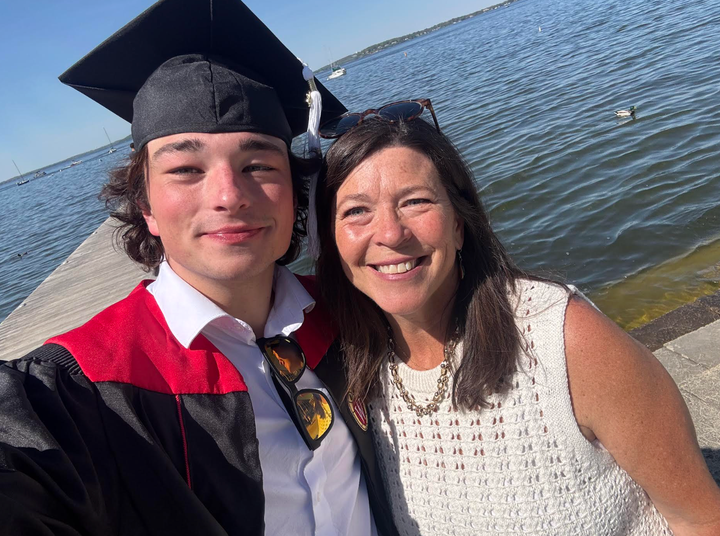🔴 Website 👉 https://u-s-news.com/
Telegram 👉 https://t.me/usnewscom_channel
It all started at the dinner table one night when my 17-year-old son Gavin said, “You know what? I never burp.”
“Never?” I asked. He shook his head. “Nope. Never.”
“Of course you do,” I nearly replied.
Everyone burps… don’t they? I thought.
Instead, I asked, “Well, does that bother you?”
“Sort of,” he said, shrugging.
We returned to our dinner, but his comment remained in the back of my mind.
Is it even possible that a person just can’t burp? I wondered. And, if so, does it even matter?
I’m not usually a worrier, and I have been guilty of trying to wait things out rather than take my kids to the doctor, not always with good results. One child turned out to have terrible strep and another one was experiencing a bad bout of pneumonia. But, in this case, because it was such an unusual comment, my mom instincts instantly kicked in. I wanted to know if this was a serious issue and, if so, what could be done to fix it.
I decided to see what Google had to say on the subject, and it turns out that yes, it is possible that people can’t burp, and yes, it most definitely matters.
Courtesy of Gretchen Scherer
According to Columbia University Irving Medical Center, the medical name for the inability to burp is retrograde cricopharyngeus dysfunction (R-CPD), which is informally known as no-burp syndrome. The diagnosis did not exist before 2019, and instead sufferers were often incorrectly diagnosed with acid reflux, irritable bowel disease or other digestive problems.
When most people need to let a buildup of air escape from their stomach, the cricopharyngeus muscle relaxes and allows the air to vacate. For reasons that are still somewhat mysterious, some individuals’ cricopharyngeus muscle stays tensed, so they never burp.
The more I thought about it, the more I realized all of the ways in which Gavin’s inability to burp had impacted him throughout his life. He was a terrible spitter-upper as a baby, and he was always more of a snacker than an eater. When he was older, he rarely drank soda, especially out of a can. He also had a reputation in our family for being able to clear a room with his farts.
He was the smallest of our three boys, and even at the peak of his growth spurt, while he was logging endless miles as a cross-country runner, he only ever ate a small amount of food at each sitting.
It was common to hear Gavin say he was full after eating only half his meal. No matter how much he loved cheeseburgers, half of it would sit on his plate uneaten. Then, two hours later, he would ask me for another dinner.
If I’m being honest, I didn’t always hide my frustration with those requests. But, luckily for both of us, I was always willing to at least make him a peanut butter and jelly sandwich (otherwise I would be wracked with guilt right now).
Although no-burp syndrome is considered relatively rare, people who suffer from it often deal with significant symptoms. Severe bloating, throat gurgling, and terrible flatulence are some of the persistent issues, and they often become worse as a person gets older. The side effects of R-CPD can cause social anxiety and significantly impact quality of life.
A few weeks after Gavin made that offhanded comment at dinner, he had his annual checkup with his pediatrician. I made sure he raised the burping issue, and Gavin described his symptoms. Unfortunately, his doctor said he’d never heard of R-CPD. Since Gavin was leaving for college the next week, we let it go.
However, when Gavin came home at Christmas several months later, he brought it up again. The coping methods he had used before — frequently eating small portions and avoiding carbonated beverages — weren’t as easy to maintain at college. Along with experiencing severe bloating, he now found himself occasionally throwing up. He wanted the problem solved, and I was becoming increasingly concerned about how R-CPD could impact him as he got older, so I kept researching.
If you google the condition today, an AI overview will tell you everything you need to know. But even just a few years ago, it was incredibly difficult to find a solution, and some of the articles and videos I did find made me worry that it could be doing severe damage to Gavin’s health.
Luckily, a friend of Gavin’s told us about a clinic near Chicago that had pioneered an experimental treatment designed to treat R-CPD by injecting Botox into the throat. We learned that the drug releases the cricopharyngeal sphincter and allows the patient to retrain the sphincter as the injectable slowly wears off. The success rate for a single procedure, which involves three shots, is over 80%, with nearly 20% needing a second procedure in order to be cured.
Armed with that information, I wasted no time trying to find a doctor in Minneapolis that could perform the procedure. Before Gavin returned to the University of Wisconsin for his second semester, I had found a local physician trained to do the throat injections, and I was able to get him evaluated. The doctor numbed Gavin’s throat and performed an endoscopy. Based on that and an evaluation of Gavin’s symptoms, the doctor determined that Gavin most likely did have R-CPD and would be a great candidate for the Botox procedure.
Gavin headed back to college, and we began the process of getting the injections approved by the insurance company. Our hope was to have the procedure done in Minneapolis, but our insurance rejected the request because the FDA has not approved Botox for this purpose. I made many calls over the next several months to our insurance company, the Minneapolis clinic, and the clinic in Chicago.
I finally found a workaround by paying out-of-pocket for the Botox (around $600), so it wasn’t submitted as part of our insurance claim. The rest of the procedure was approved, and, in our case, was 80% covered.
Two days after finishing his spring exams, Gavin was on his way to the clinic in Chicago because they could see him almost immediately. Once he was there, Gavin underwent another endoscopy, watched a video that explained the procedure, and consulted with a doctor. The next morning, Gavin was put under with general anesthesia and was given three injections of Botox in his throat. Everything went smoothly, and Gavin and his dad were on their way home by 11:30 a.m. that day.

Courtesy of Gretchen Scherer
The worst side effect from the treatment was some temporary discomfort. For the first couple of months, the esophageal sphincter is completely open, and Gavin initially described the feeling in his throat as “a little weird.” Within 24 hours, he started experiencing “micro burps,” which is the first step in retraining the cricopharyngeal sphincter. Some people also experience occasional regurgitation as they practice burping during that first week.
Patients are encouraged to burp as much as possible, so we gave Gavin full permission to burp anytime, anywhere. For most of that summer, burping was his new party trick for friends and family.
Three years after the procedure, Gavin is still burping strong, although he hasn’t quite mastered the alphabet yet. His sphincter is now completely retrained. Gavin said the procedure has been life-changing. Almost immediately, he was able to wolf down entire cheeseburgers for the first time, and the ability to drink carbonated beverages at college parties is a definite plus. I notice that he is happier in general and more energetic because he is not distracted by the discomfort that often came with eating.
I am relieved that we were able to find a solution. My Google searches had turned up stories of the extreme discomfort that some people have to live with on a daily basis. Fortunately, Gavin’s symptoms fell more on the mild to medium side of the spectrum.
The more I tell people about Gavin’s story, the less “rare” R-CPD seems. In fact, it may be more common than originally thought; at least two of my son’s friends have the same issue and one also had the procedure in Chicago. However, very few doctors are familiar with the condition and may not know enough to ask the questions that could lead to a diagnosis. Parents may not even notice that a child who burped fine as a baby stopped burping as they got older.
This journey has reminded me of several important truths about being a parent. First, don’t ignore complaints your kids make about their health — even those that seem small or nonchalant. I could have easily shrugged off Gavin’s initial comment, and I’m so glad I didn’t.
Second, doctors don’t know everything. Gavin’s pediatrician is fantastic, but he was even less familiar with no-burp syndrome than I was. I felt a little sheepish questioning him about it, but I’m really glad I kept looking for information and pushing for an answer.
Finally, don’t automatically take no for an answer from your insurance company. It took time and persistence to get an approval for (most of) Gavin’s procedure, but it was absolutely worth it in the end.
There are a lot of things I’ve gotten wrong as a parent, but thankfully, this is one of the times I got things absolutely right — and Gavin would love nothing more than to take a big swig of beer and show you himself.
Gretchen Scherer is a mother, English teacher, and sometimes writer living in Minneapolis, Minnesota. Her essays and travel articles have appeared in Salon.com, The St. Paul Pioneer Press, Minnesota Monthly Magazine, and a few anthologies.
Do you have a compelling personal story you’d like to see published on HuffPost? Find out what we’re looking for here and send us a pitch at [email protected].

